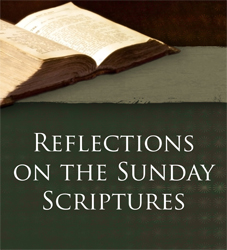“Hey you!!” Have you ever been addressed with those words and perhaps in a less than pleasing manner? I remember a few times someone saying to me something like: “You know, I do have a name.” There is something special about having a name, something pleasing about an ability to name someone. We just like to know who people are. Having a name and being able to name someone else are opportunities to be special or to, at least, feel special. Well, we have two main characters in today’s Gospel. One has a name, Lazarus; the other person is unnamed... a rich man, a generic term that says nothing about the person and perhaps minimizes him. Thus, the importance of Lazarus is his identification by name. Even though the rich man has no name, tradition has given him the name, Dives, which is just the Latin word for rich. It’s sort of the biblical equivalent for “hey you!” Who is the main character in the story? Well, as a matter of fact, they are co-stars, both have prominent roles. Lazarus, because he appears to be the winner, may stand out more. Dives, the rich man, as the loser may appear to have a secondary role. When they were both alive, Dives came off as the winner. He was rich, had all that he needed and did not seem to have a care in the world. Lazarus, on the other hand, looks like the loser. Simply put, he has nothing. In the second half of the story, the roles are reversed. Dives suffers; Lazarus has found a home in the bosom of Abraham. Dives will suffer for all eternity; Lazarus has joy for all eternity. If this story makes us nervous, then the Gospel writer has been successful in crafting the narrative, and Jesus has made his point. Many falsely believe that eternal happiness is a natural, that there is no eternal suffering. If we live with an entitlement mentality, today’s story makes no sense, and it ends up being just a story. For many the secular idea of entitlement has crept into our thinking about eternal life. In this parable, Jesus clearly describes the reality of eternal happiness and eternal condemnation. We may not like the story, but we cannot change reality. The story wants to arouse something in us. To some, also, it may appear as if Jesus is out of hand condemning the rich. However, in reading the story carefully, we see that Dives is not condemned so much for being rich as for what he did not do with his riches. Dives was never mean to Lazarus, never treated him poorly. Rather, Dives could have responded to the genuine needs of Lazarus but never did. His lack of concern and outreach led to his condemnation. The reading from Amos described what we commonly call “the good life:” beds of ivory, drinking wine from bowls, rich food, the best of music. The condemnation of Amos, again, is not that they are rich in worldly goods, but what they have done with those riches. The many gifts God has given us are meant to improve our lives and to be used for the improvement of our society, our family, our community. Among these gifts are our talents and our resources. We cannot live as individual islands. We are all responsible in so many ways for each other. Each of us is created in the image and likeness of God. For that reason alone, we must be concerned for one another. The conclusion of the story can lead us to understand that the poor need the rich to get them out of poverty, but the rich need the poor to help them out of eternal condemnation. Perhaps, the role of Lazarus in life was to help Dives get to heaven, but Dives did not respond. So, the question becomes: “Hey you! What side of eternity do you want to be on?” |
|||||


